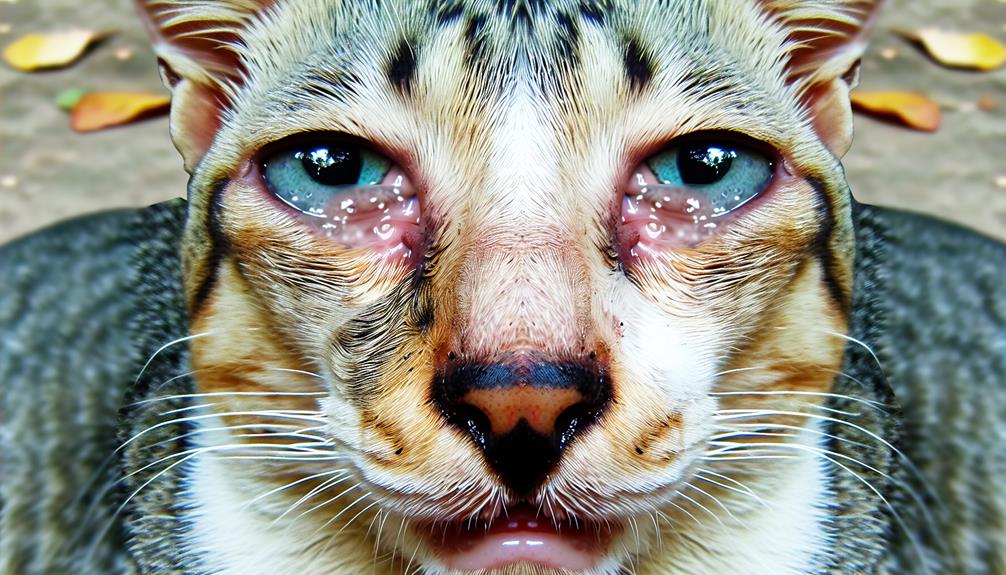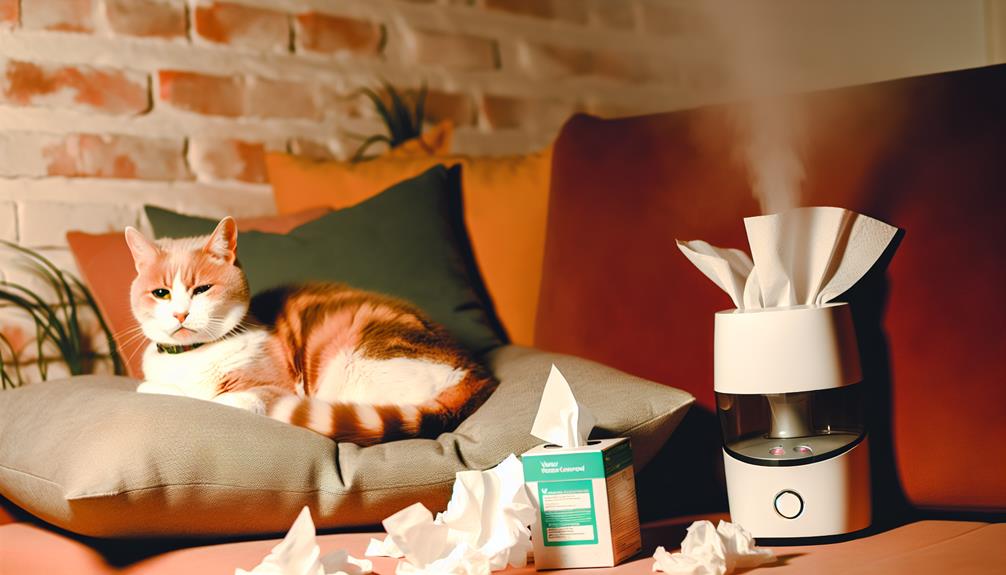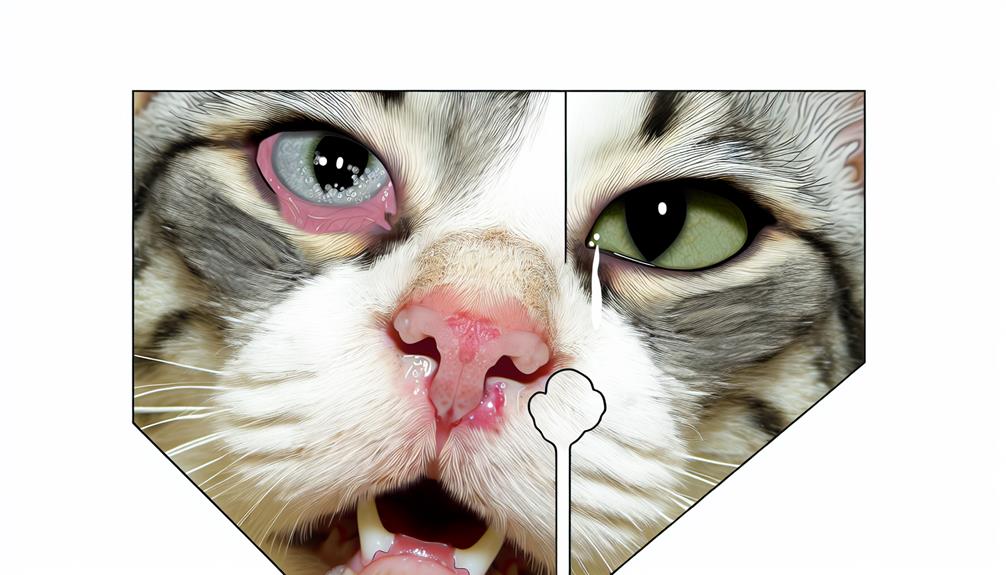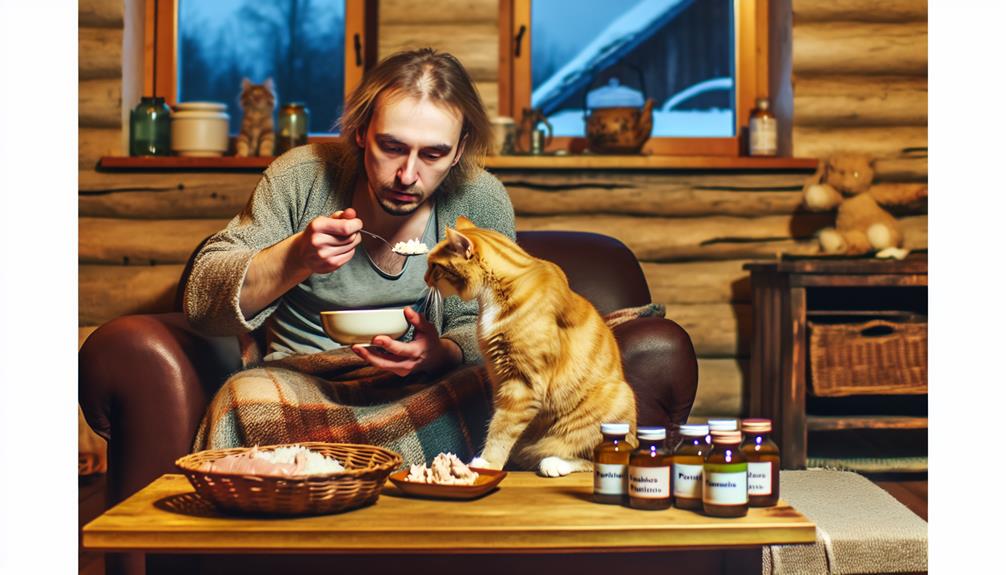Hey there! Have you ever wondered what happens when cats get sick? Well, today we will talk about a common condition called feline upper respiratory infection. It’s like a cold for cats, and just like us, they can get runny noses, watery eyes, and even sneeze! But did you know that if left untreated, these symptoms can get worse and lead to severe complications? That’s why spotting the signs early is as important as getting your furry friend to the vet. So, let’s dive in and learn more about the symptoms of feline upper respiratory infection and why taking care of our feline friends is crucial!
Key Takeaways:
- Cats with feline upper respiratory infections may show symptoms like sneezing, runny nose, coughing, watery eyes, or a stuffy nose.
- These symptoms can make your cat feel sick and affect their overall health.
- It’s important to take your cat to the vet if you notice these symptoms for early diagnosis and treatment.
- Early diagnosis and treatment can help your cat recover faster from the infection.
- Taking care of your cat’s health and being aware of these signs can help you keep your furry friend happy and healthy.
Sneezing
Why Do Cats Sneeze? The Scoop on Feline Sneezing
Have you ever wondered why cats sneeze? Well, just like humans, cats can also get infections that cause them to sneeze. One common infection is called feline upper respiratory infection (URI). Let’s find out more about why cats sneeze and how we can help them feel better!
🐱 What causes sneezing in cats?
- Cats can sneeze because their nasal passages get inflamed and irritated. This can happen when they have a viral infection like feline herpesvirus or feline calicivirus, or a bacterial infection like Chlamydophila felis.
🤧 How can we treat sneezing in cats?
- Treating sneezing in cats with URI means treating the underlying infection. Depending on the cause, the vet might prescribe antiviral or antibiotic medications to help the cat get better. They might also recommend things like humidification (adding moisture to the air) and nasal decongestants to make the cat more comfortable.
🧼 How can we prevent cats from sneezing?
- Preventing sneezing in cats with URI can be a bit tricky, but we can take some steps to reduce the risk. Here are a few tips:
- Make sure your cat is up to date on their vaccinations. Vaccines can help protect them from some of the viruses that cause sneezing.
- Try to minimize stress for your cat. Stress can weaken their immune system and make them more susceptible to infections.
- Keep things clean! Regularly clean your cat’s litter box, and wash your hands frequently to reduce the spread of germs.
Runny Nose
Why Do Cats Get Runny Noses?
Have you ever wondered why cats sometimes have a runny nose? It’s not just because they’re sad or have allergies. There’s actually a scientific reason behind it! Let’s dive into the world of feline upper respiratory infections and find out what causes our furry friends to have runny noses.
Causes of Runny Noses in Cats
Cats can get runny noses when they have a feline upper respiratory infection (URI). This happens when viruses or bacteria invade their respiratory system, causing inflammation and irritation in their nasal passages. The most common culprits behind a runny nose in cats are feline herpesvirus, calicivirus, Bordetella, and Chlamydophila bacteria.
Preventing Runny Noses in Cats
To help keep your cat’s nose from running, it’s important to maintain good hygiene and minimize their exposure to infected cats. Here are some tips to prevent a runny nose:
- Keep your cat’s living area clean and free from germs.
- Wash your hands before and after handling your cat.
- Avoid contact with other cats that may have respiratory infections.
- Make sure your cat is up to date on their vaccinations, as this can protect them from certain viral infections.
Treating Runny Noses in Cats
If your cat already has a runny nose, don’t worry! There are treatment options available to help them feel better. Here’s what you can do:
- Take your cat to the veterinarian for a proper diagnosis and treatment plan.
- Your vet may prescribe antiviral medications or antibiotics to fight off the infection.
- Medications to reduce nasal inflammation can also be given.
- Creating a warm and humid environment can help ease your cat’s nasal congestion.
Coughing
Why Do Cats Cough? Find Relief for Your Feline Friend!
Coughing can be a real pesky problem for our furry friends. Just like us, cats can also get upper respiratory infections that cause them to cough. But why does this happen? Let’s find out!
- The culprit behind the coughing: Cats with respiratory infections have inflammation and irritation in their airways, which leads to the production of extra mucus. This mucus can build up and make it difficult for them to breathe, causing coughing episodes.
- Help is on the way: While it’s important to treat the underlying cause of the cough, we can also provide relief for our cats. There are cough suppressant options available that can help ease their discomfort.
- Medication matters: Before giving your cat any medication, it’s crucial to consult with a veterinarian. They can recommend over-the-counter cough syrups or tablets specifically made for cats. Remember, the right dosage and safety are essential!
- Keep their environment clean: To reduce the frequency and severity of coughing, make sure their surroundings are free from irritants like cigarette smoke or strong chemical odors. Cleanliness is key!
- Moisturize the air: Adding humidity to the air can soothe your cat’s respiratory passages, making it easier for them to breathe. Consider using a humidifier to create a more comfortable environment for your feline friend.
Watery Eyes
Why Do Cats Get Watery Eyes?
Have you ever noticed your cat’s eyes watering and wondered why? Well, just like us, cats can get watery eyes too! Let’s dive into the reasons behind this common symptom and what you can do to help your furry friend.
- Upper Respiratory Infections:
- Cats can get infections that affect their respiratory system, including their eyes.
- The virus or bacteria causes inflammation and irritation, leading to excessive tearing or watery eyes.
- You might also notice eye discharge, which can be clear and watery or thick and yellowish.
- Allergies:
- Cats can be allergic to things like pollen, dust mites, or certain foods, just like humans.
- When they come in contact with an allergen, their immune system reacts and releases histamines.
- These histamines cause inflammation and watery eyes.
- Other Factors:
- Watery eyes can also be caused by irritants or other health issues.
- It’s important to consult with a veterinarian to determine the underlying cause and get the right treatment.
What can you do to help your cat?
- If you notice your cat has watery eyes, it’s essential to visit the vet for a proper diagnosis and treatment.
- The veterinarian will be able to determine the cause and provide appropriate treatment options.
- You can help your cat by keeping their environment clean, reducing exposure to allergens, and following the vet’s advice.
Nasal Congestion
Why Do Cats Get Stuffy Noses?
If you’ve ever had a stuffy nose, you know how uncomfortable it can be. But did you know that cats can also get stuffy noses? It’s true! When cats have a cold or an upper respiratory infection, they can experience nasal congestion. Let’s dive into this topic and learn more about it.
Causes of Nasal Congestion in Cats:
- Cats can get stuffy noses from viral infections like feline herpesvirus and calicivirus, as well as bacterial infections. These infections cause inflammation and swelling in their nasal passages, making it hard for them to breathe.
Symptoms to Look Out For:
- Besides nasal congestion, cats with stuffy noses may sneeze, cough, and have discharge from their noses. They might also seem uncomfortable, lose their appetite, and be less active than usual.
The Dangers of Chronic Sinusitis:
- If left untreated, a cat’s nasal congestion can turn into chronic sinusitis. This is a long-term condition where the sinuses (air-filled spaces in the skull) become inflamed and infected. It can cause more severe symptoms and complications.
How to Help Your Congested Cat:
- If your cat has nasal congestion, it’s important to address the underlying infection. Your vet may prescribe antiviral or antibiotic medications to fight the infection. Additionally, you can provide supportive care by using a humidifier to add moisture to the air and using nasal saline drops to help clear their nasal passages.
Frequently Asked Questions
Can Feline Upper Respiratory Infections Be Transmitted to Humans?
Frequently Asked Questions:
Q: Can I get sick from my cat’s upper respiratory infection?
A: Yes, there is a risk of transmission, especially if your immune system is weak. It’s important to practice good hygiene and avoid close contact with your cat when they’re sick.
Q: How can I prevent getting sick from my cat?
A: To lower the risk, wash your hands after handling your cat, avoid sharing personal items like towels or bedding, and keep your cat’s living area clean.
Q: What are the symptoms of a feline upper respiratory infection?
A: Cats with respiratory infections may have sneezing, coughing, runny nose, watery eyes, and reduced appetite. If you notice these signs, it’s best to take your cat to the vet.
Q: Can my cat’s upper respiratory infection be treated?
A: Yes, most respiratory infections in cats can be treated. Your vet may prescribe antibiotics or other medications to help your cat feel better.
Q: Are all cats at risk of getting a respiratory infection?
A: Yes, all cats can get respiratory infections, but kittens, older cats, and cats with weakened immune systems are more susceptible.
Q: Can I catch a respiratory infection from other animals?
A: While it’s rare, some respiratory infections can be transmitted from animals other than cats. It’s important to practice good hygiene when around sick animals.
Q: Can I catch a respiratory infection from other people?
A: Yes, respiratory infections can be transmitted between humans. That’s why it’s important to cover your mouth when you cough or sneeze and wash your hands regularly.
Q: What should I do if I think my cat has a respiratory infection?
A: If you notice symptoms like sneezing, coughing, or a runny nose in your cat, it’s best to take them to the vet. The vet can diagnose the infection and recommend appropriate treatment.
Q: Can my cat’s respiratory infection be cured?
A: In most cases, with proper treatment and care, cats can recover from respiratory infections. It’s important to follow your vet’s advice and give your cat the prescribed medications.
Q: Can I still spend time with my cat if they have a respiratory infection?
A: It’s best to limit close contact with your cat while they’re sick to reduce the risk of transmission. However, you can still spend time together from a distance and provide them with comfort and care.
Is There a Vaccine Available to Prevent Feline Upper Respiratory Infections?
Frequently Asked Questions About Preventing Feline Upper Respiratory Infections
Q: Can cats get sick with upper respiratory infections?
A: Yes, just like people can catch a cold, cats can also get upper respiratory infections. These infections can cause symptoms like sneezing, runny nose, and coughing.
Q: Is there a way to prevent cats from getting upper respiratory infections?
A: Yes, there is a vaccine available to prevent feline upper respiratory infections. This vaccine helps reduce the chances of cats getting sick and can be given by a veterinarian.
Q: How does the vaccine work?
A: The vaccine contains harmless parts of the germs that cause upper respiratory infections. When a cat gets the vaccine, their immune system learns to recognize these parts and prepares to fight off the real infection if they come into contact with it.
Q: Can all cats get the vaccine?
A: Most cats can get the vaccine, but it’s best to consult with a veterinarian. They will consider factors like the cat’s age, health, and lifestyle to determine if the vaccine is suitable.
Q: Is the vaccine a one-time thing?
A: No, cats need multiple doses of the vaccine to build up strong protection. Usually, kittens get a series of shots, and adult cats need booster shots every few years to maintain their immunity.
Q: Are there any side effects of the vaccine?
A: Like any medicine, vaccines can have side effects, but they are usually mild. Some cats may experience temporary soreness at the injection site or have a slight fever. Serious side effects are rare.
Q: What else can I do to help prevent upper respiratory infections in my cat?
A: Besides getting the vaccine, there are some other things you can do. Keep your cat’s environment clean, avoid overcrowding with other cats, and provide a balanced diet to keep their immune system strong.
Q: If my cat already had an upper respiratory infection, should they still get the vaccine?
A: It’s best to wait until your cat has fully recovered from the infection before getting the vaccine. That way, their immune system will be better able to respond to the vaccine and build stronger protection.
How Long Does It Take for a Feline Upper Respiratory Infection to Resolve Without Treatment?
Q: How long does it take for a cat’s cold to get better on its own?
A: It usually takes a few weeks for a cat’s cold to go away without treatment. The time can vary depending on how bad the infection is and how well the cat’s immune system fights it off.
Q: What is a feline upper respiratory infection?
A: A feline upper respiratory infection is like a cold in humans, but for cats. It can make them sneeze, cough, have a runny nose, and make their eyes watery. It’s caused by viruses or bacteria that can spread from cat to cat.
Q: Do cats need medicine to get better from a respiratory infection?
A: Not always. Sometimes, cats can get better on their own without medicine. But if the infection is really bad or the cat is very sick, the vet might give them medicine to help them feel better and fight off the infection faster.
Q: How can I help my cat with a respiratory infection?
A: There are a few things you can do to help your cat feel better. Keep them warm and cozy, make sure they have plenty of fresh water to drink, and feed them tasty food to keep their strength up. You can also gently clean their eyes and nose with a warm, damp cloth to keep them clean.
Q: Can I catch a respiratory infection from my cat?
A: It’s very unlikely. Most respiratory infections in cats are caused by viruses or bacteria that are specific to them. But it’s always a good idea to wash your hands after handling a sick cat, just to be safe.
Q: How can I prevent my cat from getting a respiratory infection?
A: The best way to prevent your cat from getting a respiratory infection is to make sure they are up to date on their vaccinations. Keeping their living area clean and avoiding contact with other sick cats can also help reduce the risk.
Q: When should I take my cat to the vet for a respiratory infection?
A: If your cat’s symptoms are getting worse, they’re not eating or drinking, or they seem really sick, it’s a good idea to take them to the vet. The vet can check them out and give them the right medicine to help them feel better faster.
Are There Any Home Remedies That Can Help Alleviate the Symptoms of Feline Upper Respiratory Infections?
Frequently Asked Questions about Home Remedies for Feline Upper Respiratory Infections:
- What are feline upper respiratory infections?
Feline upper respiratory infections are like colds for cats. They are caused by viruses and can make your cat sneeze, cough, and have a runny nose and eyes.
- How can I help my cat feel better?
You can try some natural remedies at home. One way is to use steam therapy. This means letting your cat breathe in steam from a warm, damp towel. It can help clear their nose and make them feel better.
- Can I use saline nasal drops for my cat?
Yes, you can! Saline nasal drops are a fancy way of saying saltwater drops. Putting a few drops in your cat’s nose can help clear out the mucus and make breathing easier.
- Are there any supplements that can help my cat’s immune system?
Yes, there are! Just like humans, cats can take supplements to boost their immune system. You can ask your vet about immune-boosting supplements that can help your cat fight off the infection.
- Do these home remedies replace going to the vet?
No, they don’t. Home remedies can help alleviate the symptoms of a feline upper respiratory infection, but it’s still important to take your cat to the vet. The vet can give your cat proper treatment and make sure they get better quickly.
What Are the Potential Complications or Long-Term Effects of Feline Upper Respiratory Infections?
Frequently Asked Questions about Feline Upper Respiratory Infections
Q: What can happen if my cat gets a respiratory infection?
A: Respiratory infections in cats can sometimes lead to other problems like bacterial infections or pneumonia. These can make your cat feel even sicker and may need extra treatment from the vet.
Q: Can a respiratory infection hurt my cat’s breathing in the long run?
A: Yes, it’s possible. When a cat gets a respiratory infection, it can cause damage to their respiratory system. This damage might not go away completely and could make it harder for them to breathe in the future.
Q: Will my cat be more likely to get sick again after a respiratory infection?
A: Unfortunately, yes. Having a respiratory infection can weaken your cat’s immune system, which is like their body’s defense against germs. So, they might be more likely to catch another infection later on.
Q: Can my cat recover fully from a respiratory infection?
A: Most cats can make a full recovery from a respiratory infection with the right care. But it’s important to give them the medicine and treatment their vet recommends, and to keep an eye on them to make sure they’re getting better.
Q: How can I help prevent my cat from getting a respiratory infection?
A: Good question! There are a few things you can do to lower the chances of your cat getting a respiratory infection. Make sure they have a clean and cozy living space, keep them away from sick cats, and make sure they’re up to date on their vaccinations.
Conclusion
So remember, if your cat is sneezing, has a runny nose, coughs, has watery eyes, or a stuffy nose, they might have a feline upper respiratory infection. These symptoms can really affect your cat’s health, so it’s important to get them checked out by a vet. Early diagnosis and treatment can help them recover faster. Take care of your furry friend and keep an eye out for these signs! If you have any questions or want to learn more, feel free to share in the comments or do some research on feline upper respiratory infections.




